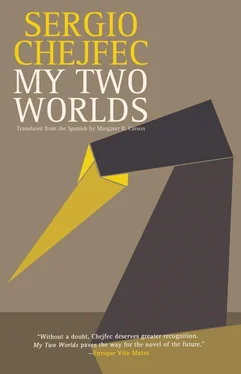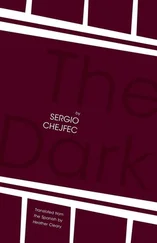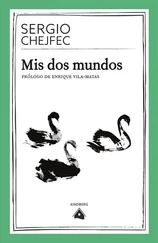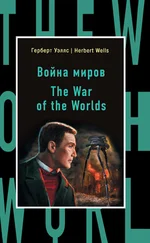It’s a feeling of uselessness and imminent boredom. The day seems endless; I think of the hours that stretch ahead as I walk and walk, blocks and blocks, one after the other, the traffic jams, noisy corners, crowds, etc., or the opposite: abandonment, solitude, order, or neglect. And I assume the surprises won’t be important, genuine surprises, but will rather be of little importance; on the other hand, I know I was never hunting for surprises, the word “surprise” has always produced rejection, if not downright fear, in me; I understand that my traveler’s sensibility, in the private language of thought, admits certain impressions that border on surprise, a state of satisfaction before an object or before a new or unnoticed event, whatever it is, a connection between the past and what’s new — and at times a bit exotic — found at that moment in the unfamiliar conglomeration of the blocks in question, etc. The truth is, I’ve stopped searching for surprises because I believe it’s become too difficult for me to find them. And so from my old yearnings I retain a basic mechanism, a kind of physical and at the same time social tic, which is the long walk.
Once I left the reception area I went to an Internet lounge, also located on the main floor, to see if I could check my email. Because it was late, I managed to find a computer that was available. The day before I’d learned that you should go to the Internet lounge during those hours, I mean, late at night, because if you went in the early evening, you’d find people, and likewise, if you went later on, when it was early morning, you’d find insomniacs. I opened my email and was intrigued by an anonymous message, or rather a message from someone who most likely wanted to hide his identity — unsuccessfully, if that was the case. The message had one or two lines, I believe only one, and with an ironic tone, it suggested that I open a link whose content I’d find very interesting or beneficial — I don’t remember what it said all that well. I had no reason to doubt it, and so, curious, I followed the instructions. The link opened to a review that had appeared in a newspaper a few days before, about a novel I’d published some months earlier.
The review was rather negative; it said the book was a failure whichever way you looked at it. I pondered the arguments and judged them weak. Then I responded to the sender in two lines, wrote other emails I had to send, read the news from Argentina for an unnecessarily long time, and went up to my room. In all likelihood the anonymous messenger had sought to mortify me, thinking I’d collapse or would give up literature because I’d published failed novels, or novels that aren’t novels, I don’t remember my exact thoughts. It was strange, because even though I should have been sad that someone wanted to humiliate me and had easily found the tools he believed would be useful in achieving his goal, I was above all comforted by the fact that I’d come across a person evidently worse than me, because that idea would never have occurred to someone better.
For various and complicated reasons, at that time I was fairly dissatisfied with my writing; that hasn’t changed, and I can say I’ve become even more dissatisfied since. While riding the elevator I thought about what had just happened, and a moment later, as I opened the door to my room, using my shoulder because the door seemed stuck, I realized that the anonymous messenger was the product of my own fiction. That my novels, good or bad, had created resentful beings who were condemned to an equivocal servitude. Even I could be one of them. I turned on the television and dimmed the screen so that I could pretend it was a radio. Then I put a book in my small backpack, a notebook for writing, my ID, money, a camera — one of those compact models — made sure I had a pen, and in this way assembled all I’d need for the walk the following day. I still had the map in my hand, which I unfolded on the bed to study carefully.
The television must have been tuned to a local station, that’s why it was broadcasting a program about the benefits of soy, its great return on investment, and the care required for its cultivation. Then there was a mini-program about vegetables and their transport. Meanwhile I devoured the map, trying to memorize something that was almost entirely unfamiliar and devoid of meaning for me, for none of the names of the avenues or the arrangements of the streets recalled any hierarchy or visual landscape. Thanks to the map’s legend, though, I was able to identify key locations, numbered 1 to 15. But even these critical points were somewhat unforthcoming, because I obviously had no idea what they stood for.
I thought the only thing holding the map on the bed before me was the great green blotch, as I called it. The sovereign park that soaked up the city’s presence and radiated energy all along the streets that came to an end there. I studied the map for quite some time, wanting to glean some valuable idea, a kind of preview of the trip, and while deep in concentration I saw a small black 9 printed at the heart of the park, a number no larger than any of the others, the convention surely a great injustice to the city’s main sustenance and ultimate justification, and yet the number had a paradoxical effect on me, the reverse of what was intended, for it strengthened my resolve to visit the park the next day, after a foreseeable, or rather, obligatory tour through the center of town and its surroundings, which I had also planned.
In this way, then, my days are dramatizations of a tramp at leisure, of a charmed life spent out in the streets, like the dandy dropping in on a strange world, where he nevertheless fails to find the hoped-for escape. This is perhaps connected to the passage of time, to whose effects we all succumb — though in different ways of course. Every task is cumulative; and if a certain weariness sets in after years of walking up and down the streets, it’s logical to think it’s caused more by time than by habit. Hour after hour, like a robot, morning and afternoon, like a misfit. I was stupefied by sunsets, at the mercy of a kind of hypnosis by which anything at all made me curious and simultaneously apathetic. A desire to know would animate me just as I sank into aimless drift. Any detail would distract me, though generally for a mere few seconds: the lights of shops, the models of cars, the makes of buses. All but people, because my robot-like walker’s inertia kept me from focusing on anyone.
When I come to think about it, my evolution as a contemporary walker — my ideal state being somewhere between curious and skeptical — got sidetracked into my present state as a disappointed and at times infuriated walker, by a process that has dragged on for years. This all started when I began, at the time unawares, searching through urban landscapes for traces of the past. It was a great and irresistible weakness to which I finally succumbed. Conceivably, European cities, and my many walks through them over the years, may have had an influence. These cities, as we know, are famous for venerating their history, or their heritage, and they raise the curtain on a fortunate, bountiful present as an extension of a so-called living past — a past thus revealed as benign. I allowed myself to be carried away by clichés of living ruins and well-preserved artifacts, and the experience must have left me with the kind of sensibility that is conditioned, I suppose, to search wherever I’m walking for traces of forgotten days, even when finding them is rarely worth the effort. Because elsewhere, outside European cities, the traces are of a distinctly different order: they aren’t visible as such, or are of a different class, or else there is, quite simply, no apogee to celebrate. Whatever the case, I was defamiliarized, that was the elusive lesson of European cities, which may explain why I go looking for things that can’t be found, are basically invisible, or don’t exist; and that don’t satisfy me when I do find them, since I can’t take them seriously. And so my walks have turned into tortuous rituals, driven onward by the indifference that comes from years and years of behaving the same way.
Читать дальше












